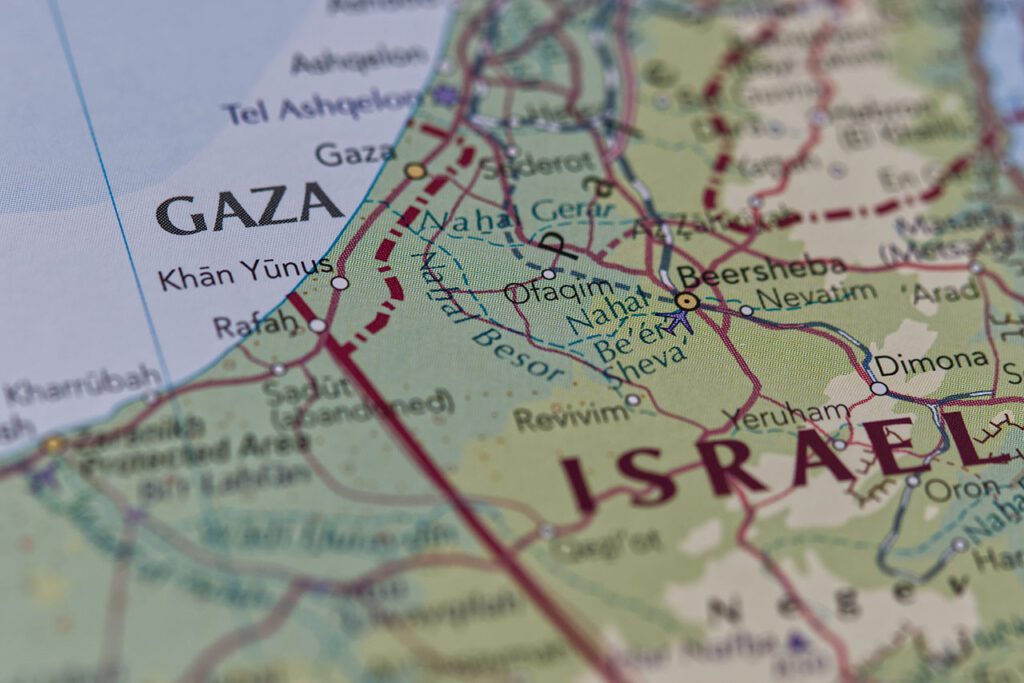Introduction
Members will be aware of the recent declaration of war by Israel against militant faction Hamas which controls the Palestine Gaza strip. Tensions are running high and the potential for the spread of conflict into Lebanon and other Middle Eastern nations and their bordering seas is significant. This Risk Bulletin (RB) seeks to raise Member awareness of the now increased risks to navigation in Middle Eastern and East Mediterranean waters and the urgent necessity to intensify shipboard ISPS Code and navigational security.
Background
Members are referred to MM RB No. 42, BIMCO Ship Security Update for Middle Eastern Waters 2021. This RB included links to BIMCO (JIG) Guidance Update and others of critical importance to Members, their Managers, DPA’s and Masters. The advice and recommendations provided in RB No. 42 are still current and applicable to all Member vessels navigating in the affected areas.
Since that time, the US DOT Maritime Commission issued a May 2023 advice and warning to all shipping navigating in Persian Gulf area waters as follows:
“A maritime threat has been reported involving two incidents of commercial vessels being seized by Iran…The first was a Marshall Islands-flagged vessel on April 27th in the Gulf of Oman and the second a Panama-flagged vessel on May 3rd in the Strait of Hormuz. Exercise increased caution when transiting the Persian Gulf, Strait of Hormuz, and the Gulf of Oman.”
The above warning was later officially withdrawn but Members should bear in mind that militant factions Hamas (operating in Gaza) and Hezbollah (operating in Lebanon) are alleged to be benefitting from Iranian financial and other support.
Current Threats
The most recent security advice is provided by US Maritime Advisory 2023 – 011 issued 6 Sept 2023. This advice focuses on US flagged commercial vessels, but it warns that Middle East waters attacks and seizures have involved other flag vessels due to possible association with the US administration and flag e.g., Panama, Liberia, and Marshal Islands, now the three most utilised ‘open registries’ in the world.
The advice refers to the “Heightened regional tensions in the listed areas, caused by an array of geopolitical issues…” and an “… increased threat level to commercial vessels.”
Bearing in mind the horrific results of the attack by Hamas on Israel and Israel’s counterattack, just one month after the above US threat advice was issued, it seems likely that the merchant ship threat level situation in both and Middle East waters (inclusive of the Eastern Mediterranean Sea) could become much worse.
The US DOT Maritime Commission’s advisory lists the threats considered to be the most prevalent. This threat list, using the advisory’s lettered headings, is summarised as below:
- Illegal Boarding/Detention/Seizure: Commercial vessels transiting through the Persian Gulf, Strait of Hormuz, and Gulf of Oman continue to be illegally boarded and detained or seized by Iranian forces. Recent incidents include the April 2023 Iranian seizure of a Marshall Islands-flagged vessel in the Gulf of Oman, and the May 2023 Iranian seizure of a Panama-flagged vessel in the Strait of Hormuz.
- UAVs (Drones): Explosive unmanned aerial vehicle (UAV) attacks on commercial vessels in the listed areas, other than the Somali Basin, remain a threat. The most recent UAV attack in this region was a probable Iranian one-way UAV attack on the Liberian flagged M/V CAMPO SQUARE on February 11th, 2023.
NOTE: Members are referred to the 14 page OCIMF publication, ‘Loitering Munitions’-The Threat to Merchant Ships’ which provides a helpful explanation and images of these drone weapons together with advice on detecting and avoiding drone attacks. - Limpet Mines: Limpet mines have been used to damage commercial vessels on multiple occasions in recent years and are primarily a threat to commercial vessels in the Persian Gulf, Strait of Hormuz, and the Gulf of Oman.
- Explosive Boats: Explosive boat attacks are a known threat to commercial vessels operating in the Red Sea, Bab al Mandeb Strait, and the Gulf of Aden.
- Piracy and Armed Robbery at Sea: Piracy and armed robbery continue to pose a threat to commercial vessels operating in the Gulf of Aden, Western Arabian Sea, and Somali Basin. Specific case details are… available at https://www.oni.navy.mil/ONI-Reports/Shipping-Threat-Reports/Worldwide-Threat-to-Shipping/.
- Navigation or Communication Disruptions: Vessels operating in these areas may encounter GPS interference (see Advisory 2023-005), AIS spoofing, bridge-to-bridge communications spoofing, and/or other communications jamming.
- Yemen Conflict: The conflict in Yemen continues to pose a risk to U.S. flagged [and other] commercial vessels in the Red Sea, Bab al Mandeb Strait, and Gulf of Aden. In addition to [the above] threats, additional threats include … missiles, rockets, projectiles, mines, and small arms.
Risk Avoidance and Mitigation
The aforesaid advisory also provides guidance on risk avoidance and mitigation. These measures include the following:
- Pre-Voyage Risk Assessment – conduct well in advance and incorporate appropriate protective measures into vessel ISPS security plans and their implementation.
- Voyage Planning and Voluntary Reporting – ensure always accomplished in accordance with International Maritime Security Construct (IMSC), United Kingdom Maritime Trade Operations (UKMTO) recommendations.
- Watchkeeping – ensure bridge is always manned appropriately, inclusive of extra lookouts.
- AIS transmission – ensure AIS unit always on, except – at the master’s order – in extraordinary but justifiable circumstances.
- VHF Channel 16 – ensure always on, tested and functioning.
Conclusion and Takeaway
The threat to merchant vessels of all flags which are trading in Eastern Mediterranean and Middle Eastern waters will likely escalate if the Israel/Hamas war intensifies. Alternatively, even if this deadly conflict can be brought under some degree of UN control, it seems likely tensions will remain high along with the increased potential for merchant vessel seizure or attack.
In the circumstances, Members are encouraged to download, review and share US Maritime Advisory 2023 – 011 with their ship managers, DPAs and Masters. Members should also re-visit MM RB No. 42 and ensure that the ISM Code SMS and ISPS Code Procedures for their vessels are reviewed and updated as necessary to reflect the current uncertainty of the Eastern Mediterranean and Middle East conflict situation and the additional security measures which may be required. Finally, Members are respectfully referred to the MMIA Rulebook and The General Rules of the Association, Rule 29 Specific Exclusions, which excludes cover for losses and liabilities caused by war (actual or threatened) and terrorist acts. Members also need to understand that MMIA does not provide supplementary War Risk cover, Members should therefore ensure that if their vessels are now or will be trading in a Joint War Committee (JWC) defined ‘Hull War, Piracy, Terrorism and Related Risks’ area (last JWC circular issued Oct. 2023), they should confer with their P&I broker to obtain and/or confirm they have suitable War Risk cover placed elsewhere in the market.


